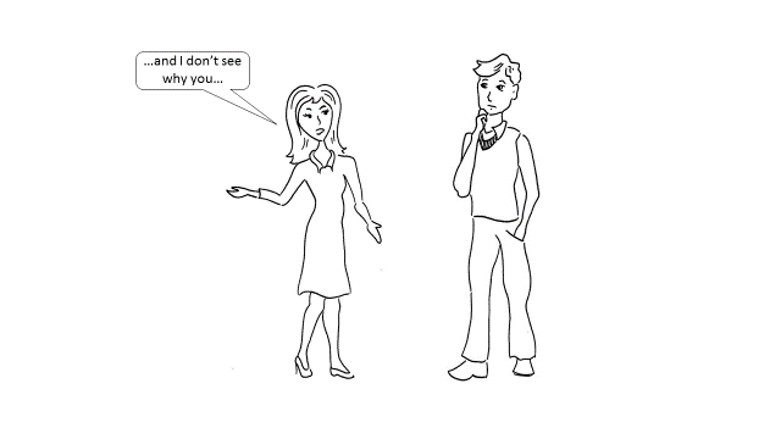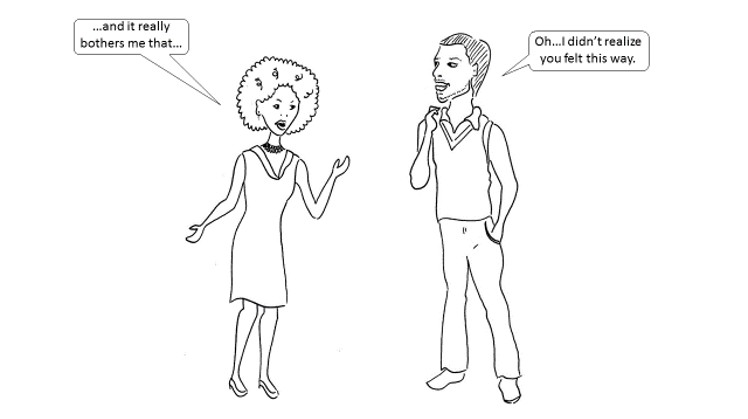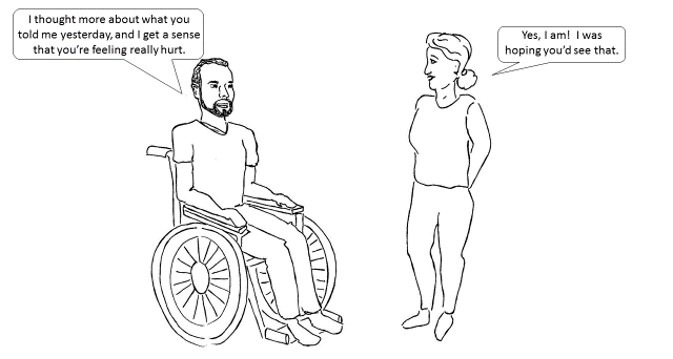News and Tools for
Happiness, Love, and Wisdom
volume 14.1 • 2020
In This Issue
Communication Skills for Restoring and Maintaining Togetherness
© 2019, Robin Ticic, BA, HP Psychotherapy, and Bruce Ecker, MA, LMFT
Adapted from the Couple Rescue Skill Builder Handbook with permission from the Coherence Psychology Institute, LLC.
So often in couple relationships, both partners find themselves yearning for the satisfying togetherness they once enjoyed. The couple’s initial mutual delight has become eclipsed by problematic patterns of interacting that feed a growing dissatisfaction.
A very common cause of couples getting stuck in dissatisfaction is differing needs and expectations of each other in the area of emotional closeness. Is that your dilemma? Maybe one of you yearns for a type of connection that is not forthcoming…and the other one may be at a loss to understand what’s missing; or one of you is making every effort as well as he or she knows how to do, and feels that it’s just not being seen or acknowledged by the other one. Life experiences with closeness and emotional intimacy vary dramatically, starting from our very beginnings. And while there is no “right” or “wrong” about how to be close to another person, there are indeed some fundamental skills that can help partners become more closely aligned in giving and receiving and encouraging emotional intimacy.
This article is for those partners who are less accustomed to emotional closeness. A relationship’s difficulties arise, as a rule, not from one partner being solely responsible, but rather from the contributions of both partners. Nonetheless, we have observed over many years of professional and personal experience that partners who initially feel uncomfortable with emotional intimacy can use the simple skills described in this article to discover the importance and the value of the emotional side of relationship. And those who are already at home with emotional closeness can further hone their skills.
As you become familiar with these specific skills, you may well find ways to work on this not just on your own, but together, in partnership. A whole cascade of welcome ripple effects could develop and enhance satisfaction in your couple relationship. Ideally, both partners will work on developing these skills.

Honing simple but often neglected communication and listening skills can rescue an increasingly troubled couple relationship. For a relationship to end due to the absence of these basic skills is like drowning in ankle-deep water - so easily avoidable by the right moves. They are not hard to make if you know what they are. And we predict you will be pleasantly surprised by what you’ll find in the rewarding world of emotional communication.
Recognizing Distress Signals
Does any of the following sound or feel familiar? Have you heard these things from your partner or said them to your partner? These are the types of distress signals typically voiced by a partner who wants more emotional intimacy and connection:
Greetings
The Wise Brain Bulletin offers skillful means from brain science and contemplative practice – to nurture your brain for the benefit of yourself and everyone you touch.
The Bulletin is offered freely, and you are welcome to share it with others. Past issues are posted at http://www.wisebrain.org/tools/wise-brain-bulletin.
Rick Hanson, PhD, edits the Bulletin. Michelle Keane is its managing editor, and it’s designed and laid out by the design team at Content Strategy Online.
To subscribe, go to http://www.wisebrain.org/tools/wise-brain-bulletin.
- You’re not listening to me. I’m talking about my feelings. You don’t even seem to notice my feelings.
- You never talk about your own feelings, either, and that leaves me feeling disconnected and totally in the dark about what’s really going on inside you. It feels as if you’re dealing with your own stuff alone or even ignoring your own issues entirely.
- When we disagree, you don’t know how to communicate or discuss things constructively.
- In sex, you don’t get my cues about what works for me and what doesn’t.
- You don’t seem to understand that before I can have any desire for sexual intimacy with you, I need to feel we’re in good emotional connection. For me, our whole relationship is foreplay. But you seem to need the physical part first in order to get to the emotional part. So we’re in a continual catch-22 about that.
- You make decisions about things that affect both of us without involving me in the decision-making process.
- You aren’t involved enough in everyday family life; it doesn’t feel like teamwork. We’re together but separate; and I feel alone in all of this.
- You think you know all the answers—and you give them, even when I’m not asking for answers or advice.
The partner who is on the receiving end of those complaints—and who may be less accustomed to emotional intimacy and connection—is usually baffled by them and might reply in some of the following ways. Do any of these sound or feel familiar?
- I feel responsible for making you happy, but I have no idea how to do that. I don’t see how I’ll ever understand you.
- I don’t feel appreciated; I’m never good enough. All you do is criticize me—even though I’m trying so hard. You don’t seem to value all that I’m already doing, fixing, and providing.
- You drag out old disagreements that we’ve gone over and over and over. I’ve explained and apologized, but you won’t let me forget about it.
- You’re not willing to have sex often enough, and you don’t get how urgently I want and need it—not just physically but also to feel connected and desired.
- You’re not romantic with me anymore. I’m confused and disappointed.
- Things have gotten serious and problematic. It’s not as much fun as before, and I don’t understand what’s gone wrong and why you’re so dissatisfied.
- I feel togetherness just from both of us being home, but that’s not good enough for you.
- The kids and your parents and even the pets are more important to you than I am.
- You blame me for not making time to talk, but how can we possibly have a conversation when the kids are constantly needing attention…or work demands are relentless…or it’s late at night when I’m exhausted and can’t possibly give you my full attention?
Understanding how emotional connection and emotional communication work is knowledge that can readily be used to create enriching, mid-course adjustments in your couple relationship.
When you are ready to begin trying out and acquiring the skills described in this article, we suggest focusing on one skill at a time, digesting it thoroughly and moving on to other skills at your own pace.
Every step you take is a step in the right direction. New skills tend to feel stilted at first, but they become natural with ongoing use. What’s most important is that you’re making that effort. And this is not about changing who you are; it’s about developing additional skills.

As your familiarity with these skills develops, you will begin to see and appreciate the deep emotional logic inherent in how people act, feel, and think. Does “emotional logic” sound like a contradiction in terms? You’ll see that it is not a contradiction at all.

Our emotional system is coherent—meaning that it has an underlying intelligence and logic. As you begin to see into that logic, your partner’s emotions and behavior will cease to be a mystery—and so will your own!
A note about pronouns
The partner who wants greater emotional closeness could be a “she,” a “he,” or a person who identifies in some other way. We’ve attempted to keep our writing gender-neutral by using composite pronouns like “s/he” and “him/her” to refer to the reader’s partner. We intend that to refer to the entire spectrum of gender possibilities. At the same time, our experience with couples tells us that very often “she” is the partner seeking greater emotional intimacy and “he” is the partner who is less familiar with that way of relating. So, we use pronouns reflecting that
common constellation in the couple example that threads through the handbook. We ask that you, dear reader, mentally adjust the pronouns to fit your situation, because this handbook is intended for use by all people and in all types of couple relationships.
SKILL 1. LISTEN

What that means: This most fundamental ingredient for couple closeness consists of giving devoted attention—to the best of your ability—when your partner is telling you about important personal things, without distractions or multitasking, like glancing at your phone or a magazine while your partner is talking.
Why it’s important: For your partner to feel your full, caring attention and caring understanding as you listen to him/her is the core of emotional connection. It’s what communicates, “You truly matter to me.” Of course, this should be a two-way process. Each of you has this basic need for attention and understanding from your partner, though perhaps to different degrees or in different ways. It’s a universal, fundamental human need to be seen and heard.
Quality personal attention is the bond—the heart and soul of connection. The feeling of closeness and connection is a major source of security, trust, warmth, joy, enrichment, and intimacy in a relationship.
How to do it: Make eye contact and listen with your full attention, with the active intention of just hearing and taking in what your partner is saying and what it means to him/her, without necessarily being able to make full sense of it yet. At this stage, listening silently is fine.
In the box below is an example illustrating this skill—and the couple depicted will thread through all of the other skills as well. Here we’re seeing this couple as they dive into a tense but not unusual interaction between partners.
It’s Saturday morning, Alex is at the breakfast table reading his newspaper, and his partner Chris announces to him, “There’s something I have to say. You’re just not pulling your weight with the kids and the household, and I’m pretty upset about it.”
In response, Alex looks right at Chris so she knows that he’s connecting with her and willing to hear about something that’s clearly important to her, even though it’s uncomfortable for him.
What might need extra attention: In the example just above, you might sense immediately how tempting or automatic it can feel to react in some way other than simply listening. You may not feel able to listen in this way for one reason or another—as, for instance, when you’re feeling defensive, or discouraged, or just plain overtired. That happens sometimes, of course, and we will guide you in skills 10 and 12 below in working through that situation when it occurs. Let’s assume for the moment, though, that you are able to listen attentively.
SKILL 2. LISTEN AND ACKNOWLEDGE

What that means: This is about letting your partner know that you are actually “letting in” and registering what s/he is telling you.
Why it’s important: In order to feel connected with you, your partner needs to know you’re taking in and considering what s/he’s saying, not just hearing the sound of his/her voice and not just waiting for the interaction to end.
How to do it: Periodically offer simple verbal and nonverbal acknowledgments in whatever way comes naturally to you as an expression of actively paying attention, such as saying “I see” or nodding while making eye contact.
As Chris begins to offer more detail about all that’s resting on her shoulders, Alex begins to acknowledge what Chris is telling him by saying, “Oh…I see…I didn’t realize you felt this way.”
What might need extra attention: As you’re fully letting in your partner’s message, it’s likely you’ll begin having your own reactions. That’s normal and natural, of course. What’s important here is to realize consciously that you are having your own reactions—which, at times, may even feel intense— and to ask yourself whether you’re able to hold your reactions for later and first dedicate yourself, for the moment at least, to making sure s/he feels heard. Again, we’re assuming for now that you are, indeed, able to listen to and acknowledge what you’re hearing from your partner. If not, skills 10 and 12 below will guide you further.
SKILL 3. LISTEN AND REFLECT BACK

What that means: Simply check in with your partner as to whether you’re understanding him/her accurately, by briefly but explicitly reviewing what you’ve heard. You’re creating a feedback loop. If your understanding is off—and that can certainly happen—s/he then has the opportunity to explain in a different way.
Why it’s important: S/he needs to know you’re engaged in understanding what you’re hearing. If you’re just sitting there and silently “getting it,” s/he won’t necessarily feel heard. Listening silently for too long can come across as non-involvement in what s/he’s telling you.
Particularly in long-term relationships it’s important to avoid assuming that you already know and understand what your partner is communicating. The only way to be sure is to create this feedback loop.
How to do it: Briefly repeat key aspects of your partner’s message in your own words. Take care to stay very close to what you’re hearing and seeing from him/her, leaving your own interpretations, elaborations, and assumptions by the wayside as much as you can, knowing you’ll get to voice your own response before long.
Statements will generally work better than questions in your quest for better understanding of your partner. Questions have a way of making people feel they need to come up with good answers— which they often don’t have. Try saying things like “What I think I’m understanding from you is…” or “It sounds as if you mean…” or “I’d love to understand more about….” Formulations of that sort contain the implicit question “Am I getting it right?” which invites—but doesn’t demand—further clarification from him/her.
Making the effort to understand is the lion’s share of showing your partner that you truly care about him/her and therefore are genuinely interested in what s/he’s saying to you.
Chris tells Alex, “I feel left alone with the responsibilities of caring for the children and running the household… and it feels as though you’re not really together with me in it.”
Alex responds, “What I’m getting is that for you it’s not only about sharing the effort fairly, it’s also very much about feeling we’re really together in it, which you haven’t been feeling. I didn’t realize that before.”
What might need extra attention: Right at this juncture, many partners will be very tempted to defend themselves, or to explain why the partner’s feelings are “wrong.” See if you can dedicate yourself, though, to just listening and really understanding what you’re hearing about what your partner is experiencing. Remember that understanding your partner does not mean you are agreeing with him/her or feeling the same way yourself. This can be very challenging at first. Most people find that it takes concerted practice, so be patient with yourself.
SKILL 4. EMPATHIZE

What that means: To empathize is to put yourself in the other person’s shoes…to pay attention to what the other person is experiencing and, to some degree, have a vicarious sense of what your partner seems to be feeling. To communicate your empathy is to make it apparent to the person that you are really tuning in to what s/he is experiencing and feeling, and how s/he is understanding things.
Whereas an understanding of the content of your partner’s communication—the actual words—is largely an intellectual endeavor, empathizing with how s/he feels forges an emotional connection in which you’re getting a “felt sense” of his/her subjective experience. Ideally, you’re operating on both of those tracks. You need to understand the content well enough to be able to empathize accurately with your partner’s experience of that content. So you focus on content at certain moments and then bring your focus back to his/her subjective experience. With practice, this alternation in focus becomes a natural ebb and flow.
Why it’s important: Your partner needs to know you can relate to how s/he feels—or at least that you’re making your best attempt to do so. Seeing that it matters to you to understand your partner’s experience is often all s/he really wants and needs in order to feel emotionally connected to you. Yes, it’s that simple! You don’t have to figure out how to solve your partner’s problem. In fact, solving his/ her problem won’t engender emotional connection (and we’ll talk more about this later on), but empathizing will.
Maybe at times you find yourself regarding emotions as something problematic and messy— something better to avoid. For sure, the extreme emotionalism of some people can be difficult and unpleasant. That isn’t representative of emotion in people’s lives, however, and emotions are not inherently problematic. In fact, they are crucial for directly experiencing connection and life in its richness. A person’s emotions exist—they’re right there—and any attempts to ignore them or play them down will very likely backfire.
How to do it: As you respond and reflect back, also tell your partner what you understand s/he’s feeling and experiencing—and why these things matter to him/her—right alongside the factual content that you’re acknowledging.
Chris says, “It just doesn’t feel as though we’re actually together in life. We started this family together, but it feels more and more as though we’re just living our separate lives in parallel… kind of together in name only.”
Hearing that, Alex pays attention to the feelings Chris seems to be having. He even lets her know what’s coming across to him that she might not be saying out loud by saying, “I’m getting the idea that you’re feeling not only overworked, but actually almost abandoned… as if we went into all of this together but now you’re having to fend for yourself. Is that how it’s feeling to you?”
What might need extra attention: Listening, understanding, and empathizing can initially feel like a big job. When you see your partner’s happiness in feeling more connected with you, though—and his/her resulting satisfaction with you—you’ll feel the effort it requires of you is well worth making. Be aware, too, that s/he’ll need to see that you are fairly consistent and reliable in maintaining genuine emotional contact before s/he can really count on it to be a regular part of life together, as s/he needs it to be. Trust grows from consistency over time, so that means you need to keep at it! Don’t be discouraged if it takes time to cultivate your partner’s trust in your newly emerging capacity for emotional communication.
That night, as Alex is trying to be physically intimate with Chris, she reveals more about how she feels— feelings that have been stored up for a long time. She says, “Oh—so now you want to come around and ‘visit’ me for the fun stuff! How can you expect me to be close this way all of a sudden, when I don’t feel closeness coming from you in all the other ways that matter to me? It just doesn’t work that way for me!”
You may want to argue with your partner or prove him/her wrong—very understandably. And it can be extremely challenging for you to empathize if you’re feeling criticized or unappreciated! You’ll discover, though, as you become more skilled at listening deeply, that it is futile to argue against someone’s feelings. They are what they are. However, feelings can change as a result of new experiences.
For some people, being sexual may be the very way to feel close. If that’s how you feel, you may be puzzled if it’s not that way for your partner. For other people, a major factor governing the inclination to be sexual is the emotional closeness that comes from feeling emotionally understood by their partner. In that case, emotional understanding and empathy are crucial ingredients in opening the door to sexuality.
If your partner’s heart, mind and body follow different patterns from yours, that doesn’t mean that his/ hers are wrong or in need of correction—just as your patterns of heart, mind and body are valid for you. Your desires for having satisfying sex are not wrong, and neither are the conditions that enable your partner to be receptive to being sexual. It’s a matter of two people’s needs being understood and responded to respectfully.
What works best as a first step, therefore, is simply to pay attention and express recognition and acceptance of your partner’s pattern just as it is, even though that pattern may be a dilemma for you. And remember that your patterns may be a dilemma for your partner, as well.
In sex it is particularly important to hear with empathy and remember your partner’s indications of what s/he enjoys and doesn’t enjoy. Few missteps in couple relationship are as alienating as not heeding or even remembering your partner’s indications of what doesn’t feel okay sexually, and then engaging in those unwelcome behaviors yet again. Why? Because when you again do what you’ve already been told causes suffering, to your partner that registers emotionally as meaning that you don’t truly care about him/her, and that your own pleasure matters more to you than sparing your partner from strong discomfort or even distress. To love someone means that that person’s well-being is as important to you as your own well-being. To love someone means you remember what gives him/her delight and what brings suffering. Listening with empathy is how you hear those messages loud and clear.
You can’t read your partner’s mind—about sex or anything else—but you can notice and remember what s/he does mention about what s/he enjoys, wants, needs, finds interesting, or is curious about—whether it’s some useful item, a book, a movie, a type of food, a new experience, or anything else. Your caring thoughtfulness in hearing, remembering and actively responding—without your partner asking you to do so—is one of the most powerful and beautiful ways of communicating your love and making your partner feel loved, far more deeply, in fact, than great sex can ever do.

ABOUT THE AUTHOR
 Robin Ticic, BA, HP Psychotherapy (Germany), director of
development and training of the Coherence Psychology Institute,
is in private practice near Cologne, Germany, specializing in trauma
therapy, and for many years served as a psychologist for the
Psychotraumatology Institute of the University of Cologne. She is a
certified trainer of Coherence Therapy and conducts clinical workshops
internationally. She is co-author of Unlocking the Emotional Brain: Eliminating Symptoms at Their Roots Using Memory Reconsolidation and author of How to Connect with Your Child. She has extensive experience in communications counseling, courses and presentations, and has been honored for her community work with parents.#
Robin Ticic, BA, HP Psychotherapy (Germany), director of
development and training of the Coherence Psychology Institute,
is in private practice near Cologne, Germany, specializing in trauma
therapy, and for many years served as a psychologist for the
Psychotraumatology Institute of the University of Cologne. She is a
certified trainer of Coherence Therapy and conducts clinical workshops
internationally. She is co-author of Unlocking the Emotional Brain: Eliminating Symptoms at Their Roots Using Memory Reconsolidation and author of How to Connect with Your Child. She has extensive experience in communications counseling, courses and presentations, and has been honored for her community work with parents.#
 Bruce Ecker, MA, LMFT, is co-director of the Coherence Psychology
Institute, co-originator of Coherence Therapy, and co-author of Unlocking the Emotional Brain: Eliminating Symptoms at Their Roots Using Memory Reconsolidation; the Coherence Therapy Practice Manual & Training Guide; and Depth Oriented Brief Therapy: How To Be Brief When You Were Trained To Be Deep and Vice Versa. Clarifying how transformational change takes
place is the central theme of Bruce Ecker’s clinical career, and he has contributed many innovations in concepts and methods of experiential psychotherapy. Since 2006 he has driven the clinical field’s recognition of memory reconsolidation as the core process of transformational change and has developed the application of this brain research breakthrough to advancements in therapeutic effectiveness. Bruce is a frequent presenter at conferences and workshops internationally, has taught extensively in clinical graduate programs, and has a private practice.
Bruce Ecker, MA, LMFT, is co-director of the Coherence Psychology
Institute, co-originator of Coherence Therapy, and co-author of Unlocking the Emotional Brain: Eliminating Symptoms at Their Roots Using Memory Reconsolidation; the Coherence Therapy Practice Manual & Training Guide; and Depth Oriented Brief Therapy: How To Be Brief When You Were Trained To Be Deep and Vice Versa. Clarifying how transformational change takes
place is the central theme of Bruce Ecker’s clinical career, and he has contributed many innovations in concepts and methods of experiential psychotherapy. Since 2006 he has driven the clinical field’s recognition of memory reconsolidation as the core process of transformational change and has developed the application of this brain research breakthrough to advancements in therapeutic effectiveness. Bruce is a frequent presenter at conferences and workshops internationally, has taught extensively in clinical graduate programs, and has a private practice.
Leonie Schwettmann, BA, Fine Arts, is a recipient of the 2016 prize from the Leibniz-Zentrum fuer Lebenslanges Lernen for promising young artists, as well as the 2018 Deutschland stipendium in art and architecture.
Conversations with Teenagers: Coping with Anxiety and Depression
© 2019, Melanie Medland
We still have a long way to go getting people to understand how debilitating and lonely mental illness is. Chances are, if you are reading this, then you may have an inkling of just how dark a person’s world can get. And sadly, people with anxiety and depression often report that they are getting addicted to drug. In such cases it is better to seek the help of bipolar treatment center to get rid off drug addiction.If you are ever in the position to lighten another’s load simply try for a little kindness. When your teenager has anxiety and depression things change Depression and anxiety make a person’s mind work differently. To actually get vulnerable and tell another person how terrible they are feeling will be going against every fiber in your teenager’s body. The courage and bravery they need in order to share is immense because they will strongly believe that if you know how awful they are inside you won’t love them, much less want to help them. Useful responses Listening to understand is a useful and empathetic response. Say “That sucks.” Or “You must be really … at the moment.” Give them a hug and tell them you love them. Let them know they are your priority and that you are there for them. It’s also helpful to find out if the anxiety or depression has come on suddenly or slowly: has it just arrived, or has it been creeping up bit by bit? Don’t take on their pain, you will be of little or no use if you jump down into the pit to be with them. Your job is to stay at the top of the pit, where you can see them, hear them and guide them. Let them know you will never, ever, leave your place. You will be there for them always. You understand their pain, but you don’t feel it yourself. You’re going to need to remember that some days. Be curious, ask “What if …” questions and open questions that need their input. For example, “What do you think would happen if …” to get them looking for solutions and generating possibilities that will take them away from their current place of stuckness. The importance of accurate labeling of emotions All of our human emotions can be traced back to four basic emotions: mad, sad, glad, and scared. Every emotion comes from one of those four. At the very least your child needs to be able to identify, feel, and name these four emotions when they are preschoolers. They need to be in touch with where they feel these emotions in their bodies. Why is this so important? The emotion you are feeling will color the lens you are viewing the world through. Let me give you an example:
- If you wake up in the morning and you are feeling mad, chances are you will get out of bed with a stomp, snarl, or snap at people in the house and slam things around.
- If you are feeling sad, you will probably be more inclined to shuffle out of bed, walk around with a downcast glance and not even bother to greet the people in the house.
- If you wake up feeling glad you will probably bounce out of bed, greet other people in the house with a hug and a smile, and go through your morning routine with a smile, a song, or a joke.
- If you wake up feeling scared you are more likely to sidle out of bed, tip toe around the house and communicate in a quiet voice or with whispers.
I know which way I’d prefer to wake up. And I know which way I’d prefer my teens to wake up. One of those basic feelings is going to alter the way you see the world and the way you show up in the world. When you are aware of how you are feeling you can understand why you are speaking and doing and showing up as you do. And you can also understand why your teenager is speaking and behaving as they do. But if you can’t name your feelings, then there’s a problem. Because without being able to name your feelings you won’t be able to take appropriate action to address problems, behaviors, and generate solutions. We know that emotions can change quickly due to a myriad of different factors. Teach your teens: Don’t think that if you wake up mad you have to stay like that for the day. Again, it’s about choice. One of your many roles as a parent is to teach your teenager how to recognize and respond to the emotions they are feeling inside themselves. Mindfulness is important; once we are able to recognize and take responsibility for our feelings we learn to see the energy we bring to our relationships. Showing up as our adult selves always makes the world a better place. And teaching our children to show up as their adult selves: pure gold. Why is empathy so important? Empathy is when you walk alongside another person, giving them support at the level they are at, while urging them to move forward by themselves. This means listening actively, helping them to problem solve and providing them with a framework that lets them meet the expectation that they will be okay. Empathy is empowering, non-judgmental and unconditional. And for parents with anxious, depressed teenagers it’s really important to add another layer here. Compassion is when they suffer but you don’t. It may sound a bit harsh, but it’s really important that you don’t pick up their feelings and treat them like your own. Right now, you are the rock and that means you can’t afford to be pulled along by their feelings. You can acknowledge them and understand them, but you can’t take them on for yourself. Anxiety and depression are keeping your teenager stuck, and if you join them in their anxiety and depression, who will be the one to pull them out? For your own emotional health, be really strong about understanding and acknowledging their feelings but not picking them up for yourself. How you can help There are lots of pathways and alternatives to explore. Be guided by their wishes and if you are concerned that what they’re doing isn’t enough/going to work then phone a mental health crisis line yourself and talk over options with a trained support person. It’s a free service that you shouldn’t hesitate to use. Sometimes, a loved one may need more structured and intensive support to overcome addiction. In such cases, it may be necessary to explore options for professional help, such as an alcohol treatment program. While it may be difficult to broach the topic with them, it’s important to remember that seeking treatment is not a sign of weakness but rather a brave step toward recovery. There is a range of alcohol treatment programs available, from outpatient therapy to residential rehab, and it’s important to find the right fit for their unique needs and circumstances. Don’t hesitate to reach out to a mental health crisis line or addiction specialist for guidance on finding the best resources and support for your loved one.  Your teenager may say “No, they think they’ve got this,” and feel so much better just knowing you are available to listen and support them. Again, if you’re not sure this statement is true, phone a mental health crisis line and talk to them about your concerns. If you feel it’s useful, make an offer and be prepared to make a plan. It may be as simple as arranging a time to check in with them every day or approaching the school to see if they are able to switch a class. As long as you’ve engaged in an open problem-solving process with active listening and teenager generated solutions you will be able to find a way forward together. It’s not about you Notice your own triggers. When your teenager tells you “I just want to die.” It hits you like a giant concrete block has landed in your heart. You find yourself wondering why you’re not good enough for them to want to live. You might be mad with them that they’re so ungrateful for the wonderful life you’ve given them, or the sacrifices you’ve made for them. You will feel like a failure as a parent. And this is coupled with the awareness that you have a very real chance of losing them. Be kind to yourself. Their anxiety and depression is not about you at all so remember that as you take some deep breaths and process this life altering information. Deal with your stuff, notice what triggers you and put it all mentally inside a box with a big stop sign on it. Take care to look after yourself, this is a tough time. The beauty of failure is that it is simply feedback; it’s coming with a message, so get ready to take notes. I strongly urge you to get professional help so you can be proactive about working on your stuff. Which will leave you with more energy and focus to support your teenager. Mindfulness is important; once we are able to recognize and take responsibility for our feelings, we learn to see the energy we bring to our relationships. Showing up as our mindful and aware adult selves always makes the world a better place.
Your teenager may say “No, they think they’ve got this,” and feel so much better just knowing you are available to listen and support them. Again, if you’re not sure this statement is true, phone a mental health crisis line and talk to them about your concerns. If you feel it’s useful, make an offer and be prepared to make a plan. It may be as simple as arranging a time to check in with them every day or approaching the school to see if they are able to switch a class. As long as you’ve engaged in an open problem-solving process with active listening and teenager generated solutions you will be able to find a way forward together. It’s not about you Notice your own triggers. When your teenager tells you “I just want to die.” It hits you like a giant concrete block has landed in your heart. You find yourself wondering why you’re not good enough for them to want to live. You might be mad with them that they’re so ungrateful for the wonderful life you’ve given them, or the sacrifices you’ve made for them. You will feel like a failure as a parent. And this is coupled with the awareness that you have a very real chance of losing them. Be kind to yourself. Their anxiety and depression is not about you at all so remember that as you take some deep breaths and process this life altering information. Deal with your stuff, notice what triggers you and put it all mentally inside a box with a big stop sign on it. Take care to look after yourself, this is a tough time. The beauty of failure is that it is simply feedback; it’s coming with a message, so get ready to take notes. I strongly urge you to get professional help so you can be proactive about working on your stuff. Which will leave you with more energy and focus to support your teenager. Mindfulness is important; once we are able to recognize and take responsibility for our feelings, we learn to see the energy we bring to our relationships. Showing up as our mindful and aware adult selves always makes the world a better place.  When to have a conversation about suicide If you’re worried that a conversation about suicide might trigger a suicide attempt, be aware that if you’re worried enough to be thinking about a conversation like this then chances are your teenager may have already thought about it themselves. We know that depression and anxiety actively stop sufferers from seeking help. You asking the question to get the conversation started could well be a lifesaving move. Another wise move is to make it clear that if there is ever anything your teen can’t tell you directly, they can always leave you a note or send you a text. To which you will have time to consider a loving response. Teenagers are sometimes worried about talking about suicide because it might upset their parents. Which it will, but nowhere near as much as the consequence of dealing with an attempt, or a suicide. It may simply be parental intuition. Just knowing that they seem to be going downhill or that something’s up. Follow the nudge, if you’re wrong then EXCELLENT. If you’re not then you’re BRAVE. You may also get some guidance from the following sources: 1. You notice that they seem to have a lack of future thoughts; as in they don’t see themselves growing older or having a future. There may be a lack of planning around what they intend to do when they have finished school/uni/their job/a holiday. Like they don’t see themselves having a life that will stretch on. This is a great place to start a conversation. Or you may be listening to them talking about plans as you realize that they haven’t actually done anything to make those plans come to life. For example, they may be talking about going to university but not actually made any moves to find out about any universities. As in none. 2. Everything in their life seems to be full of helplessness. It’s like they’re not really in charge at all and they’re constantly waiting for others to do something to help them along. Sometimes things do involve a bit of waiting, but all the time? No.
When to have a conversation about suicide If you’re worried that a conversation about suicide might trigger a suicide attempt, be aware that if you’re worried enough to be thinking about a conversation like this then chances are your teenager may have already thought about it themselves. We know that depression and anxiety actively stop sufferers from seeking help. You asking the question to get the conversation started could well be a lifesaving move. Another wise move is to make it clear that if there is ever anything your teen can’t tell you directly, they can always leave you a note or send you a text. To which you will have time to consider a loving response. Teenagers are sometimes worried about talking about suicide because it might upset their parents. Which it will, but nowhere near as much as the consequence of dealing with an attempt, or a suicide. It may simply be parental intuition. Just knowing that they seem to be going downhill or that something’s up. Follow the nudge, if you’re wrong then EXCELLENT. If you’re not then you’re BRAVE. You may also get some guidance from the following sources: 1. You notice that they seem to have a lack of future thoughts; as in they don’t see themselves growing older or having a future. There may be a lack of planning around what they intend to do when they have finished school/uni/their job/a holiday. Like they don’t see themselves having a life that will stretch on. This is a great place to start a conversation. Or you may be listening to them talking about plans as you realize that they haven’t actually done anything to make those plans come to life. For example, they may be talking about going to university but not actually made any moves to find out about any universities. As in none. 2. Everything in their life seems to be full of helplessness. It’s like they’re not really in charge at all and they’re constantly waiting for others to do something to help them along. Sometimes things do involve a bit of waiting, but all the time? No.
The Wellspring Institute For Neuroscience and Contemplative Wisdom
The Institute is a 501c3 non-profit corporation, and it publishes the Wise Brain Bulletin. The Wellspring Institute gathers, organizes, and freely offers information and methods – supported by brain science and the contemplative disciplines – for greater happiness, love, effectiveness, and wisdom. For more information about the Institute, please go to http://www.wisebrain.org/wellspring-institute.
If you enjoy receiving the Wise Brain Bulletin, please consider making a tax-deductible donation to the Wellspring Institute. Simply visit WiseBrain.org and click on the Donate button. We thank you.
3. Your teenager may feel hopeless, say that everything is hopeless, or talk about themselves as being hopeless. Again, occasionally this works, but not all the time. 4. There seems to be a lack of real life friends and a lack of interest in doing “normal” teenage things like hanging out. 5. Things that used to interest them and make them happy no longer hold the same appeal. 6. Your teenager might have initiated a conversation with you about a “friend” who is thinking about committing suicide. Don’t ever let those conversations go, sometimes teenagers are simply testing your reactions out. I’d be inclined to ask them if their friend has a plan and a way of making it work then take the conversation from there. 7. One of their friends may have committed suicide already. If this is the case, you need your teenager to have unlimited access to top quality counseling. And still keep talking to them, your relationship with your teenager is ultimately more important than their relationship with a counselor. The 3 questions to ask 1. Have you thought about killing yourself? 2. Do you have a plan? 3. Can you make the plan work? Let’s break these questions down
Question 1: The brave opening question: Have you thought about killing yourself?
If they say “No” you will have a feeling of calm. You can tell them “I’m relieved to hear that. Please promise me that you’d come and talk to me if this situation ever changes.” Explain to them why you felt like this was a good question to ask. And extend the conversation with openended questions like “How are you managing at the moment? What things are you doing to help yourself? How are they going? Is there anything I can help with?” If they ever want to tell you something but don’t know how to notes, text, and messaging are all acceptable alternatives. Let them know you notice them. And of course, tell them you love them. No matter what.
Question 2 (to be asked if they say “Yes” To Q1): Do you have a plan?
You will be feeling panicked and gutted at the same time. Know your triggers and don’t go there. Instead be outwardly calm. Keep reminding yourself that this is not about you. If they say “No” then you can be mentally congratulating yourself for brave and “onto it” parenting. A big hug is required here. Don’t stop talking now (tempting because you will be in shock) instead, go with the following open-ended questions. “What things are you doing to help yourself? How are they working for you? What can I help you with?” And listen to their answers. Really listen. It’s not worth going into the why’s of their feelings right now. Save that conversation for a time in the very near future. You may find that the why’s can only lead to further upset, when really you are wanting to be proactive and empowering. Things will be emotional enough after a conversation like this and yes, the why’s are important, but don’t let them drag you away from the more important next steps you can help them with. If they say “Yes” keep telling yourself it’s not about you. This is about them and their pain. Get them talking with questions like “Tell me about it. What are your intentions? Who else have you talked to about this? What is your timeframe?” 
Question 3 (to be asked if they say they have thought about killing themselves and they have a plan): Can you make the plan work?
Right now, you’ll be hoping they say “No.” A big hug is required here. This is a true cry for help. Ask them “What things are you doing to help yourself? How are they working for you? Is there anything I can help with?” in a loving and non-judgmental way. Don’t let the conversation lapse without some plan or way to move forward together. If they say “Yes” to Question 3 tell them “You’ve taken a brave step by sharing so honestly. Do you think this is the best choice? Is it the only way forward? What are some other options you can think of?” Explore options together. Be open, be accepting, be non-judgmental, and be loving. This is your time to fight for the person you brought into the world and to do the very best for them. You are in a unique position to be trusted with their feelings and their hearts. Treat them tenderly. Be kind to yourself How many conversations like this did you have as a teenager? Probably none. You may well be feeling completely unprepared. Be kind to yourself. Going into an important conversation with an attitude of love and empathy will get you through. And remember to get support for yourself. This is a time when any good parent will recognize it’s not about themselves. Closing Thoughts A conversation about suicide does not necessarily mean your teenager will commit suicide. It means they need help and support, yes. And a conversation like this can also mean the beginning of a way forward. Take heart, get support for yourself and be prepared to dig in. Your teenager is going out into the world so be prepared to be there for them all the way.
ABOUT THE AUTHOR
 Our teenagers are facing pressures we never had to deal with as they move from child to adult. Unfortunately suicide is becoming a response they turn to as their path becomes murky and difficult. Melanie Medland successfully supported her daughter through severe teenage anxiety and depression, including suicide attempts. She is now using her knowledge to coach and support parents of teenagers with anxiety and depression. Visit www.movingthrough.net for more information.
Our teenagers are facing pressures we never had to deal with as they move from child to adult. Unfortunately suicide is becoming a response they turn to as their path becomes murky and difficult. Melanie Medland successfully supported her daughter through severe teenage anxiety and depression, including suicide attempts. She is now using her knowledge to coach and support parents of teenagers with anxiety and depression. Visit www.movingthrough.net for more information.
Even in the Struggle
© 2011 Tara Sophia Mohr
Even in the struggle, you are loved. You are being loved not in spite of the hardship, but through it. The thing you see as wrenching, intolerable, life’s attack on you, is an expression of love.
There is the part of us that fears and protects and defends and expects, and has a story of the way it’s supposed to turn out. That part clenches in fear, feels abandoned and cursed.
There is another part, resting at the floor of the well within, that understands: this is how I am being graced, called, refined, by fire.
The secret is, it’s all love. It’s all doorways to truth. It’s all opportunity to merge with what is.
Most of us don’t step through the doorframe. We stay on the known side. We fight the door, we fight the frame, we scream and hang on.
On the other side, you are one with the earth, like the mountain. You hum with life, like the moss. On the other side, you are more beautiful: wholeness in your bones, wisdom in your gaze, the sage-self and the surrendered heart alive.
ABOUT THE AUTHOR
 Tara Sophia Mohr is an expert on women’s leadership and well-being, and an author, educator and certified coach. Tara is the author of Playing Big: Practical Wisdom for Women Who Want to Speak Up, Create, and Lead, published by Penguin Random House, and named a Best Book of the Year by Apple’s iBooks. She is the creator of the pioneering Playing Big leadership program for women, and Playing Big Facilitators Training for coaches, mentors and managers who support women in their personal and professional growth. Her work has been featured on The Today Show and in publications ranging from The New York Times to goop to Harvard Business Review. More than 50,000 women from around the world follow Tara’s writing and wisdom. She lives in San Francisco and loves dance, art, and long walks with her family.
Tara Sophia Mohr is an expert on women’s leadership and well-being, and an author, educator and certified coach. Tara is the author of Playing Big: Practical Wisdom for Women Who Want to Speak Up, Create, and Lead, published by Penguin Random House, and named a Best Book of the Year by Apple’s iBooks. She is the creator of the pioneering Playing Big leadership program for women, and Playing Big Facilitators Training for coaches, mentors and managers who support women in their personal and professional growth. Her work has been featured on The Today Show and in publications ranging from The New York Times to goop to Harvard Business Review. More than 50,000 women from around the world follow Tara’s writing and wisdom. She lives in San Francisco and loves dance, art, and long walks with her family.
Skillful Means : Developing an Inner Guide
Your Skillful Means, sponsored by the Wellspring Institute, is designed to be a comprehensive resource for people interested in personal growth, overcoming inner obstacles, being helpful to others, and expanding consciousness. It includes instructions in everything from common psychological tools for dealing with negative self talk, to physical exercises for opening the body and clearing the mind, to meditation techniques for clarifying inner experience and connecting to deeper aspects of awareness, and much more.
Developing an Inner Guide

Purpose/Effects
An inner guide can be a great ally for your emotional and spiritual wellbeing. Developing an internal nurturing and encouraging figure reminds you of your abilities and good qualities, while providing counsel in difficult times. An inner guide combines the benefits of a good friend (a shoulder to lean on) with selfinquiry and introspection, allowing us to make better decisions and improving our self-esteem and selfimage when we need it most.
Method
Summary
Find a figure and allow it to help sustain you.
Long Version
1. Choosing a guide may seem like a difficult task. There are many options to choose from. Your selection should be informed by your own personal needs: if you are hard on yourself, choose a figure you think will offer unconditional love; if you need steeling and unsparing encouragement, choose a figure that you respect as a caring but tough hero.
Perspectives on Self-Care
Be careful with all self-help methods (including those presented in this Bulletin), which are no substitute for working with a licensed healthcare practitioner. People vary, and what works for someone else may not be a good fit for you. When you try something, start slowly and carefully, and stop immediately if it feels bad or makes things worse.
2. You might choose a real person, alive or dead, whom you have known. Perhaps you had a grandmother who was always a source of intense love and affection, or perhaps your father always knew how to sternly but lovingly snap you out of lazy spells. These guides don’t have to be accurate representations of the people they represent; think of them as archetypes put in easy-to-recognize forms.
3. You might choose a guardian angel-type figure, one that seems detached from this world but that nonetheless has a powerful investment in you. A divinity also can be a great guide, whether Christ or a bodhisattva. Figures from mythology that attract and inspire us can also be great guides, nurturers, and protectors.
4. You might pick a person or animal that appears in your dreams, if she/he/it seems to be a repository of love and useful wisdom. For more on dreams as a source of real guidance and inspiration, see https://dreamtending.com/.
5. Of course, there is a long tradition of animal spirit guides. Don’t try to adhere to traditional indigenous totem traditions; if a hedgehog or a walrus seems appropriate, by all means let it be your guide.
6. When you have found your guide figure (when your guide figure has found you), you can proceed in many ways. You can allow its voice to come to you when in need, or you can actively engage with it.
7. When dealing with a difficult situation, you might want to think to your inner guide figure. She/he/ it might begin to offer encouragement, advice, or a pep talk. This doesn’t mean you’re crazy! The guiding figure is your subconscious’ way of helping you with what you need.
8. You may also want to enter a meditative state through deep breathing and physical relaxation. In this state, you can engage actively with your inner guide and ask she/he/it for help. Record what you learn and use it in the future.
9. Constantly engage with and build up your relationship with your inner guide, and its strength will increase.
HISTORY
Praying for guidance is a part of many traditions, and through the ages saints, bodhisattvas, and angels have acted as inner guides for many people in many different cultures. The stereotype of the indigenous American spirit animal comes from many different traditions: from the totemism of the Pacific Northwestern tribes to the nahualism of the Mesoamerican people, animals were often seen as embodying traits that influenced and guided humans. In the late 19th century, early new age groups known as Spiritualists and Theosophists began talking explicitly about “spirit guides,” often channeled spirits of the dead.
NOTES
Sometimes your best inner guide might come to you in a dream. The characters in our dreams, both those based upon people and things we know in waking world and the completely mentally fabricated, offer insight into what we might need in a guiding figure.
SEE ALSO
Establishing Safety
Lovingkindness
EXTERNAL LINKS
Meeting Inner Figures with Active Imagination

Fare Well
May you and all beings be happy, loving, and wise.

